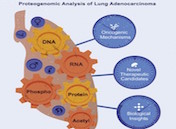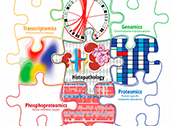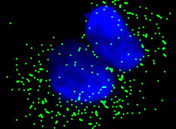News & Events

Rackham King Talks - Mahnoor Naseer Gondal
On Thursday, January 30, this year’s King Talks featured six Rackham students communicating the relevance of their work to Dr. Martin Luther King Jr.’s legacy in a TED-talk style. As always, the King Talks relate to the theme of the U-M MLK Symposium, which this year is “Restless Dissatisfaction: An Urgent Call for the Pursuit of Justice and Equality.”
Mahnoor's talk, entitled "Mentorship Matters: Nurtruing the Next Genearation of Women in Science through Power of Choice" is available on YouTube.

Lung adenocarcinoma study published by CPTAC
In a study published in the journal Cell in July this year, members of the Clinical Proteomic Tumor Analysis Consortium (CPTAC) from MCTP and, UM collaborators, teamed with other investigators in an international effort, to characterize the proteogenomic profiles of lung adenocarcinoma. This investigation led to a comprehensive proteogenomic characterization of 110 lung adenocarcinomas and 101 matched normal adjacent tissues (NATs) incorporating genomics, epigenomics, deep-scale proteomics, phosphoproteomics, and acetylproteomics. Multi-omics clustering revealed four subgroups defined by key driver mutations, country, and gender. Proteomic and phosphoproteomic data illuminated biology downstream of copy number aberrations, somatic mutations, and fusions and identified therapeutic vulnerabilities associated with driver events involving KRAS, EGFR, and ALK. Smoking-associated LUADs showed correlation with other environmental exposure signatures and a field effect in NATs. Matched NATs allowed identification of differentially expressed proteins with potential diagnostic and therapeutic utility. This proteogenomics dataset represents a unique public resource for researchers and clinicians seeking to better understand and treat lung adenocarcinomas. The study was published in Cell.
UM Authors: Saravana M. Dhanasekaran, Rahul Mannan, Pankaj Vats, Chandan Kumar-Sinha, Felipe da Veiga Leprevost, Gilbert S. Omenn, Marcin P. Cieslik, Alexey I. Nesvizhskii and Arul M. Chinnaiyan
Additional Authors from MCTP: Rohit Mehra, Seema Chugh, Sunita Shankar
Read press release

AGO2 role in pancreatic cancer development
MCTP researchers, led by Dr. Sunita Shankar, have identified a protein — Argonaute 2 — that appears to be critical for the progression of benign precursor lesions into pancreatic cancer. Both KRAS and EGFR are essential mediators of pancreatic cancer development and interact with Argonaute 2 (AGO2) to perturb its function. Here, using a mouse model of mutant KRAS-driven pancreatic cancer, they showed that loss of AGO2 allowed precursor lesion (PanIN) formation yet prevented progression to pancreatic ductal adenocarcinoma (PDAC). In mouse and human pancreatic tissues, PDAC progression was associated with increased plasma membrane localization of RAS/AGO2. Altogether, this study supports a biphasic model of pancreatic cancer development: an AGO2-independent early phase of PanIN formation reliant on EGFR-RAS signaling, and an AGO2-dependent phase wherein the mutant KRAS-AGO2 interaction is critical for PDAC progression. These findings were published in Nature Communications.
Read press release

Dr. Chinnaiyan Elected to the National Academy of Sciences
Dr. Arul Chinnaiyan, Director of MCTP, was elected to the National Academy of Sciences. The National Academy of Sciences announced today the election of 120 members and 26 international members in recognition of their distinguished and continuing achievements in original research. Those elected today bring the total number of active members to 2,403 and the total number of international members to 501.
The National Academy of Sciences (NAS) is a private, nonprofit organization of the country’s leading researchers. The NAS recognizes and promotes outstanding science through election to membership; publication in its journal, PNAS; and its awards, programs, and special activities. Through the National Academies of Sciences, Engineering, and Medicine, the NAS provides objective, science-based advice on critical issues affecting the nation.
Read more

Novel kidney cancer sub-type analysis
Investigators from MCTP and UM collaborators, along with other participants of the Clinical Proteomic Tumor Analysis Consortium (CPTAC), have generated the most comprehensive multi-omics dataset for clear cell renal cell carcinoma (ccRCC), the most commonly diagnosed kidney cancer subtype. The study used integrative proteogenomics, to reveal new insights into kidney cancer and was published in Cell.
CPTAC is a program under the National Cancer Institute's Cancer Clinical Proteomics Research (OCCPR) whose mission is to improve prevention, early detection, diagnosis, and treatment of cancer by enhancing the understanding of the molecular mechanisms of cancer, advance proteome and proteogenome science and technology development through community resources (data and reagent), and accelerate the translation of molecular findings into the clinic.
MCTP members involved in CPTAC projects are: Mohan Dhanasekaran, Yuping Zhang, Arul Chinnaiyan, and Marcin Cieslik. UM collaborators include Alexey I. Nesvizhskii and Gilbert S. Omenn.
Read more

Newly Defined Cancer Driver FOXA1
A new study from researchers at MCTP showed that the alterations in the gene FOXA1 fall into three structural classes that diverge in clinical incidence and genetic co-alteration profile to drive prostate cancer. FOXA1 was previously known to be mutated in prostate cancer but its biological functions were poorly understood. Using RNA sequencing data from 1,546 prostate cancer samples from multiple collections, including from MI-ONCOSEQ clinical sequencing study, FOXA1’s role as a driver oncogene has been further elucidated.
Read more

Promising New Compounds to Treat Advanced Prostate Cancer
MCTP researchers, in collaboration with Dr. Shaomeng Wang’s lab, have demonstrated the efficacy of a new set of compounds known as BET degraders for the treatment of metastatic castration-resistant prostate cancer. Patients with metastatic prostate cancer often develop resistance to standard therapies that target the androgen receptor signaling pathway. Through a different mechanism, BET degraders can disrupt the signaling of the androgen receptor, as well as the oncogene, MYC. In experiments, the BET degraders significantly suppressed cancer growth in prostate cancer cell lines and in mouse models that used patient-derived tumors, known as xenografts. These compounds warrant further investigation for future clinical development.
Read more

The landscape of circular RNA in cancer
Circular RNAs (circRNAs) are an intriguing class of RNA due to their covalently closed structure, high stability, and implicated roles in gene regulation. MCTP researchers used an exome capture RNA sequencing protocol to detect and characterize circRNAs across >2,000 cancer samples. Using capture sequencing, they built the most comprehensive catalogue of circRNA species to date: MiOncoCirc, the first database to be composed primarily of circRNAs directly detected in tumor tissues. Using MiOncoCirc, they identified candidate circRNAs to serve as biomarkers for prostate cancer and were able to detect circRNAs in urine. Further, a novel class of circular transcripts, termed read-through circRNAs, that involved exons originating from different genes were detected. MiOncoCirc will serve as a valuable resource for the development of circRNAs as diagnostic or therapeutic targets across cancer types. This study was published in Cell.
Read more

Michigan Legacy Tissue Program
Read about the Michigan Legacy Tissue Program by MCTP faculty member, Rohit Mehra.
Read Article

Dr. Chinnaiyan Receives Outstanding Investigator Award
MCTP Director, Dr. Arul Chinnaiyan has received an Outstanding Investigator Award from the National Cancer Institute, which provides $6.5 million in funding over seven years. The grant will fund research to create new bioinformatics resources and identify new cancer biomarkers to improve diagnosis and ultimately to develop new targeted therapies.
Read more

CDK12 inactivation defines a new class of prostate cancer
MCTP researchers, led by Yi-Mi Wu and Dan Robinson, have identified a new subtype of prostate cancer that occurs in about 7 percent of patients with advanced disease. The subtype is characterized by the loss of the gene CDK12. It was found to be more common in metastatic prostate cancer compared with early-stage tumors that had not spread. CDK12 mutant cases are associated with elevated neoantigen burden ensuing from fusion-induced chimeric open reading frames and increased tumor T cell infiltration/clonal expansion and thereby defines a distinct class of metastatic prostate cancers that may benefit from immune checkpoint immunotherapy.
Read more

Discovery of a novel prostate cancer lncRNA
Researchers at MCTP identified a novel long noncoding RNA, ARLNC1 that is strongly associated with AR signaling in prostate cancer progression. Not only was ARLNC1 induced by the AR protein, but ARLNC1 stabilized the AR transcript via RNA-RNA interaction. ARLNC1 knockdown suppressed AR expression, global AR signaling, and prostate cancer growth in vitro and in vivo. Taken together, these data support a role for ARLNC1 in maintaining a positive feedback loop that potentiates AR signaling during prostate cancer progression and identify ARLNC1 as a novel therapeutic target.
Read more

Discovery of a novel non-coding RNA, THOR
From an initial large-scale screening for highly conserved long intergenic non-coding RNA with varying evolutionary conservation, lineage expression, and cancer specificity, we discovered and functionally characterized a novel ultraconserved lncRNA, THOR that exhibits expression exclusively in testis and a broad range of human cancers. THOR knockdown and overexpression in multiple cell lines and animal models altered cell or tumor growth supporting an oncogenic role. We discovered a conserved interaction of THOR with IGF2BP1 and showed that THOR contributes to the mRNA stabilization activities of IGF2BP1. Notably, transgenic THOR knockout produced fertilization defects in zebrafish and also conferred resistance to melanoma onset. Likewise, ectopic expression of human THOR in zebrafish accelerated the onset of melanoma. THOR represents a novel class of functionally important cancer/testis lncRNAs whose structure and function have undergone positive evolutionary selection.
Read more

New FISH Assays to Aid Renal Cancer Diagnosis
The recent availability of molecular data on renal tumors has resulted in a clinically useful World Health Organization (WHO)-driven classification system including several new and intriguing subtypes such as translocation-associated renal cell carcinoma (t-RCC) and inherited renal neoplasms. RCCs with melanogenesis-associated transcription factor (MITF) aberrations demonstrate a wide morphologic spectrum, highlighting the need to consider these entities within the differential diagnosis of renal tumors encountered in clinical practice. Although immunohistochemistry (IHC) for MITF family proteins TFE3 and TFEB are specific for t-RCC, there is poor reproducibility of TFE3 or TFEB IHC, and the sensitivity is not high enough to exclude the possibility of false-negative results. FISH, however, has been robustly validated for the accurate diagnosis of these renal tumor subtypes and exhibits a high degree of sensitivity and specificity. Earlier, Dr. Rohit Mehra and colleagues developed clinical fluorescence in situ hybridization (FISH) assays to detect TFE3 and TFEB translocations that are offered through UM genitourinary FISH service (at MLabs). Information about these test can be found in the Pathology Handbook (#4979 & #4980)
Additionally, Dr. Mehra recently led a study where they applied clinical FISH assays for the detection of TFE3 and TFEB gene aberrations in a large consecutive cohort of cases clinically, morphologically, and/or immunophenotypically suspicious for t-RCC. Results demonstrated that 37% of tumors were confirmed to demonstrate MITF aberrations (21 TFE3 translocation, 4 TFEB translocation, and 6 TFEB amplification cases). They described six new genotypically proven TFEB-amplified renal cell carcinoma cases and found morphologic features that may aid in the identification of renal cell carcinomas with MITF aberrations. Overall, TFE3 and TFEB FISH enabled accurate classification of renal cell carcinomas with MITF aberrations, including TFEB-amplified renal cell carcinoma, which may demonstrate aggressive behavior. The results of this study were published in and featured on the cover of Modern Pathology (Mod Pathol. 2017 Aug 25).

Clinical genomics of metastatic cancer
Recently, we carried out a comprehensive molecular analysis of metastatic solid tumors of diverse lineage and biopsy site from 500 adult patients (MET500 cohort) by performing clinical-grade integrative whole exome (tumor/normal) and transcriptome sequencing. Sequencing matched tumor and normal samples from patients identified potentially pathogenic germline alterations as well as provided high-resolution copy number landscapes. RNA sequencing analysis provided insights into the tumor lineage, functional gene fusions, transcriptional pathway activation, viral pathogen, and immune cell landscape. We found that the most prevalent genes somatically altered in metastatic cancer included TP53, CDKN2A, PTEN, PIK3CA, and RB1. Putative pathogenic germline variants were present in 12.2% of cases of which 75% were related to defects in DNA repair genes, most commonly occurring in BRCA1, BRCA2, CHEK2, and MUTYH. Tiering of the molecular alterations identified in metastatic cancers provided a rationale for clinical trial or registry study enrollment in 72% of cases and guideline-based recommendations in 16% of cases. Our results demonstrate that integrative sequence analysis provides a clinically relevant, multidimensional view of the complex molecular landscape and microenvironment of metastatic cancers. The manuscript presenting the analysis of the MET500 cohort has been published in Nature (2017 Aug 2. doi: 10.1038/nature23306).

Precision medicine: view from two sides
Read about the advances, promises, and challenges of precision medicine.
Read more

Immunohistochemical Detection of HLRCC Markers
Dr. Rohit Mehra led a study on hereditary leiomyomatosis and renal cell carcinoma (HLRCC) that is caused by germline mutations in the FH gene and is associated with an increased incidence of leiomyomas and a potentially aggressive variant of renal cell carcinoma (HLRCC-associated RCC). The absence of fumarate hydratase (FH) expression as determined by immunohistochemistry has previously been used to diagnose HLRCC-associated RCC, but immunohistochemical staining of leiomyomas is not standard practice. Here, Dr. Mehra and colleagues performed immunohistochemistry (IHC) on whole sections from consecutive cutaneous leiomyomas from archived samples (96 samples from 87 patients) to evaluate for both FH and succinate dehydrogenase B expression, in addition to clinicopathologic data collection and review of all hematoxylin and eosin-stained slides for blinded morphologic evaluation of features reported to be seen in HLRCC-associated uterine leiomyomas. The overall sensitivity and specificity of negative FH expression in leiomyomas for detection of patients with HLRCC were 70.0% and 97.6%, respectively. Inclusion of cases classified as equivocal increased sensitivity to 75.0%. Succinate dehydrogenase B expression was retained in 95 specimens and equivocal in 1 specimen. None of the evaluated morphologic features showed any association with leiomyomas in HLRCC. Absent FH immunohistochemical expression in cutaneous leiomyomas is a sensitive and specific marker for detection of HLRCC, thus suggesting a role for prospective FH IHC in patients with these tumors to screen for HLRCC. The results of this study were published in Am J Surg Pathol (2017 Jun;41(6):801-809).
Immunohistochemical assays for FH and SDH-B are routinely performed for clinical use as/when indicated to detect syndromic neoplasia at Michigan Medicine Department of Pathology.

A new therapeutic approach to target prostate cancer
The gene encoding the transcription factor ERG is recurrently rearranged in over 50% of prostate cancer patients; ERG plays a critical role in prostate cancer oncogenesis. Recently, we identified a series of peptides that interact specifically with the DNA binding domain of ERG and inhibit its activity. ERG inhibitory peptides and derived peptidomimetics (EIPs) bound ERG with high affinity and specificity, leading to proteolytic degradation of ERG protein. The EIPs attenuated ERG-mediated transcription, chromatin recruitment, protein-protein interactions, cell invasion and proliferation, and tumor growth. Thus peptidomimetic targeting of transcription factor fusion products may provide a promising new therapeutic strategy for prostate cancer as well as other malignancies. The results of this study were published in Cancer Cell.
Read more

Dr. Chinnaiyan featured in the journal, Cancer
Dr. Chinnaiyan was featured in an article in the journal Cancer, tracing his research career.
Read more

Recent MCTP Awardees
Congratulations are in order for a number of MCTP members who were recent recipients of various awards:
- Abhijit Parolia was awarded the DOD Early Investigator Research Award
- Jenny Choi received a scholarship to attend the Workshop on Techniques in Modeling Human Cancer in Mice being held August 20-27, 2017 at The Jackson Laboratory in Bar Harbor, Maine
- Steve Kregel was reappointment for another year on the Cancer Biology T32 Training Grant and was awarded a DOD Postdoctoral Fellowship
- Yashar Niknafs was invited to give an oral presentation in a Minisymposium session at the 2017 AACR Annual Meeting in Washington, D.C.
- Sunita Shankar was invited to give an oral presentation in a Minisymposium session at the 2017 AACR Annual Meeting in Washington, D.C.
- Yajia Zhang was awarded the 2016 Prostate Cancer Research Program (PCRP) Early Investigator Research Award – Predoctoral Fellowship

MCTP Wins OSEH Safety First Award
MCTP was awarded the Occupational Safety & Environmental Health Safety First Recognition Award. This award is presented to individuals or workgroups within the University of Michigan community who are committed to making the University of Michigan a safer place. Nominations for this award were reviewed and the winner was selected by the Safety First Recognition Team within OSEH. The MCTP team will receive recognition during a catered reception at the workplace.

MCTP Award Recipients
Please congratulate the following MCTP members that were recent award recipients:
- Yashar Nikfas was awarded the AACR-Bristol-Myers Squibb Oncology Scholar-in-Training Award. The Award recognizes outstanding young investigators for their meritorious work in cancer research. He also was awarded the Rackham Predoctoral Fellowship.
- Sethu Pitchiaya received the 2016 AACR-Bayer Prostate Cancer Research Fellowship for his project entitled, “Androgen receptor regulation by lncRNA PRCAT47 in prostate cancer”.
- Rohit Malik received the DOD Prostate Cancer Research Program (PCRP) Idea Development New Investigator Award for his project entitled, “Discovery and Characterization of PRCAT47: A Novel Prostate Lineage and Cancer-Specific Long Noncoding RNA”.
- Lanbo Xiao received the FY2015 DOD Prostate Cancer Research Program (PCRP) Fellowship entitled, "Biological characterization and clinical utilization of metastatic prostate cancer-associated lincRNA SchLAP1".
- Sunita Shankar received 1st place for her abstract presentation entitled, “KRAS Engages AGO2 for Cellular Transformation” at the APHPMP Research Day held at BRSB, the University of Michigan on Feb 13th, 2016.

A novel KRAS-AGO2 interaction in cancer
The Discovery of a functional KRAS-AGO2 interaction may have implications for a novel therapeutic strategy for KRAS-driven cancers.

AACR visits Washington DC
On January 8, 2016, fifteen distinguished American Association for Cancer Research (AACR) leadership and members including Dr. Arul Chinnaiyan, from 10 cancer centers and medical institutions all across the U.S. (from nine different states) participated in meetings with top officials from the Food and Drug Administration (FDA) to discuss FDA’s current thinking on how the agency might regulate NGS-based tests, as well as interrelated topics, such as laboratory-developed tests (LDTs) and companion diagnostics for cancer therapies. The AACR used the meeting as an opportunity to provide information and important perspectives to the FDA as it begins developing NGS-related guidance for the scientific community.
In addition, the AACR team was invited to a separate meeting with senior staffers for Vice President Joe Biden to discuss ways the Vice President can further his commitment to cancer research. The Vice President believes that his power is in 1) serving as a convener; 2) influencing Federal agencies, and 3) spurring public-private partnerships; he is specifically interested in determining how to incentivize collaboration and breaking down barriers.
The AACR Team was well-received by both the FDA officials as well as the Vice President's staff, the meetings were productive and encouraging.

Genetic landscape of pediatric cancers
MCTP researchers and collaborators have published the results from the first 102 pediatric patients enrolled in the PEDS-ONCOSEQ clinical sequencing study (JAMA, Vol. 314, No. 9, Sept. 1, 2015). A total of 91 pediatric patients with advanced or relapsed cancer underwent complete sequence analysis. Forty-two patients (46%) had actionable findings that changed their cancer management and individualized actions were taken in 23 patients based on actionable integrative clinical sequencing findings, including change in treatment for 14 patients and genetic counseling for future risk for 9 patients. Nine of the personalized clinical interventions resulted in ongoing partial clinical remission of 8 to 16 months or helped sustain complete clinical remission of 6 to 21 months. All 9 patients and families with actionable incidental genetic findings agreed to genetic counseling and screening. The study is the first to report on combined multiple genome sequencing approaches (tumor as well as normal DNA and tumor RNA) in real-time, in children and young adults with relapsed cancers.
Read more

Mutational landscape of metastatic CRPC
Recently, MCTP investigators, in collaboration with the Prostate Cancer Foundation-Stand Up 2 Cancer (PCF-SU2C) International Dream Team Consortium, led the study to develop a precision medicine framework for metastatic, castration-resistant prostate cancer (mCRPC) by obtaining a comprehensive landscape of cancer-related mutations in order to potentially incorporate this information for therapeutic strategies and/or enrolling subjects into appropriate clinical trials. The study involved 8 clinical sites and two sequencing sites, and a total of 150 patient biospecimens were subject to comprehensive sequence analysis (whole-exome and transcriptome). Overall, the sequencing results revealed that 90% of mCRPC samples harbored clinically actionable molecular alterations in several major pathways: AR, PI3K, WNT, DNA repair, and cell cycle. The results of this study were recently published in Cell (Cell. 2015 May 21;161(5):1215-28).
Read more

Targeting MLL complex in CRPC
Resistance to androgen deprivation therapies and increased androgen receptor (AR) activity are major drivers of castration-resistant prostate cancer (CRPC). Although prior work has focused on targeting AR directly, co-activators of AR signaling, which may represent new therapeutic targets, are relatively under-explored. MCTP researchers and colleagues demonstrated that the mixed-lineage leukemia protein (MLL) complex, a well-known driver of MLL fusion-positive leukemia, acts as a co-activator of AR signaling. AR directly interacts with the MLL complex via the menin-MLL subunit. Menin expression is higher in CRPC than in both hormone-naive prostate cancer and benign prostate tissue, and high menin expression correlates with poor overall survival of individuals diagnosed with prostate cancer. Treatment with a small-molecule inhibitor of menin-MLL interaction blocked AR signaling and inhibited the growth of castration-resistant tumors in mice. Taken together, this work identifies the MLL complex as a crucial co-activator of AR and a potential therapeutic target in advanced prostate cancer. The results of this study were published in Nature Medicine.
Read more